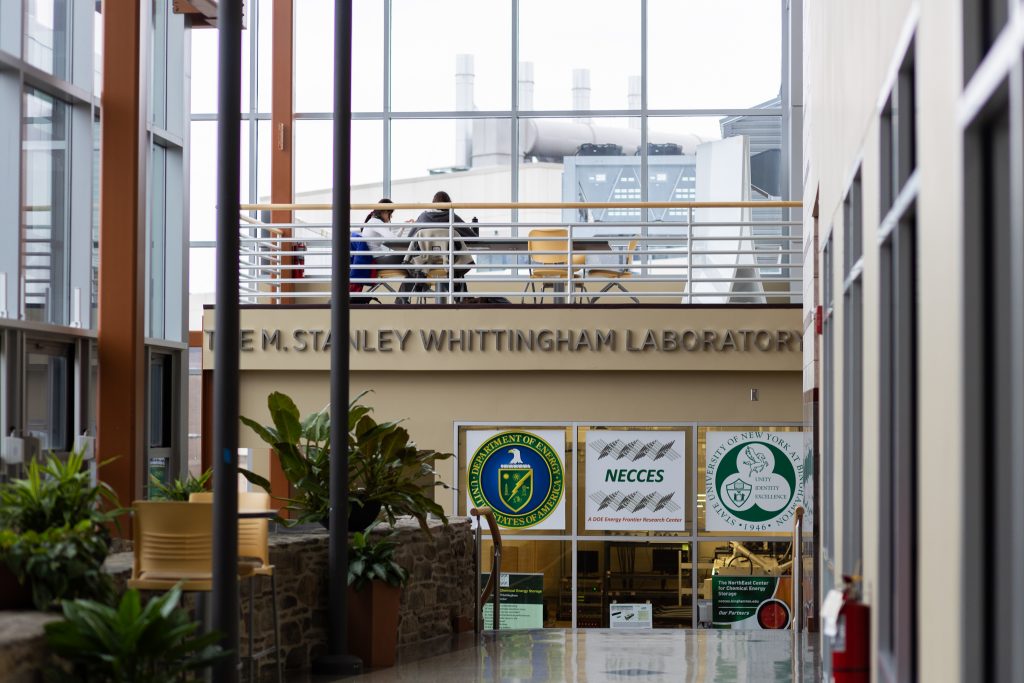On Monday, the National Science Foundation (NSF) designated a Binghamton University-led battery project as a Regional Innovation Engine, awarding it up to $160 million over 10 years.
The achievement was announced by U.S. Sen. Chuck Schumer (D-NY), the majority leader and a champion of Binghamton’s battery industry, whose CHIPS and Science Act created the competition. The funding follows over $113 million won in 2022 and last October’s designation of the Southern Tier as a Regional Tech Hub.
The project, Upstate New York Energy Storage Engine, is run through New Energy New York (NENY), led by BU in partnership with institutions including the Rochester Institute of Technology, SUNY Broome and Empire State Development. It was one of 10 projects selected.
“Lightning has struck not once, not twice but three times to supercharge Binghamton and the NENY coalition as best in class to grow cutting edge research in America’s battery industry,” Schumer said in a press release. “For years I have worked to craft and lead to passage these new programs to spur economic development, create good-paying jobs and spark scientific innovation, specifically with places like Binghamton and upstate [New York] in mind.”
$15 million in federal funding was unlocked immediately following the announcement.
The Southern Tier’s recognition by national research institutions has been largely driven by the work of M. Stanley Whittingham, a distinguished professor of chemistry who won the Nobel Prize in Chemistry alongside two others in 2019 for their work on the lithium-ion battery. Whittingham was Schumer’s guest at President Joe Biden’s State of the Union address last February.
Whittingham’s ties to BU were listed as a “competitive advantage” on the NSF’s website profiling potential winners.
“It is critically important that battery innovations stemming from university and industry researchers can be developed, prototyped and manufactured in the [United States] in order to leapfrog today’s Asian technology,” Whittingham said in Schumer’s release. “With [Schumer’s] continued support, we are confident we can transform our region, attract investment, create new jobs and fill those jobs with a skilled workforce.”
The Regional Innovation Engine competition seeks to advance critical technologies, address societal challenges, facilitate collaboration between the public and private sectors and spur economic growth, according to the NSF.
Winners span both the country and several categories of innovation. “Energy, Advanced Materials, Disaster Prevention, Water” projects, aside from Binghamton, include initiatives based in Arizona, the Great Lakes region, North Carolina, Colorado and Wyoming and Louisiana.
“Advanced Manufacturing, Robotics, AI, Semiconductor” winners were established in El Paso, Texas and central Florida, and agriculture technology recipients are based in North Dakota and Piedmont, NC.
The expanded governmental initiatives in recent years correspond closely with Biden’s agenda to increase domestic manufacturing. In his 2020 campaign for president, Biden presented his “Build Back Better” agenda to voters, emphasizing his upbringing in Scranton, PA and promising to invest federal money into research “in a way not seen since the Great Depression and World War II.”
“We have all of the right academic and research collaborators on board, we are partnered with major industries as well as small businesses and our ecosystem is diverse,” University President Harvey Stenger said in response to Schumer’s announcement. “This is what the NSF Engines program is all about. Of course, we want to thank [Schumer] for his vision, leadership and support for [BU] and the entire NENY coalition.”



